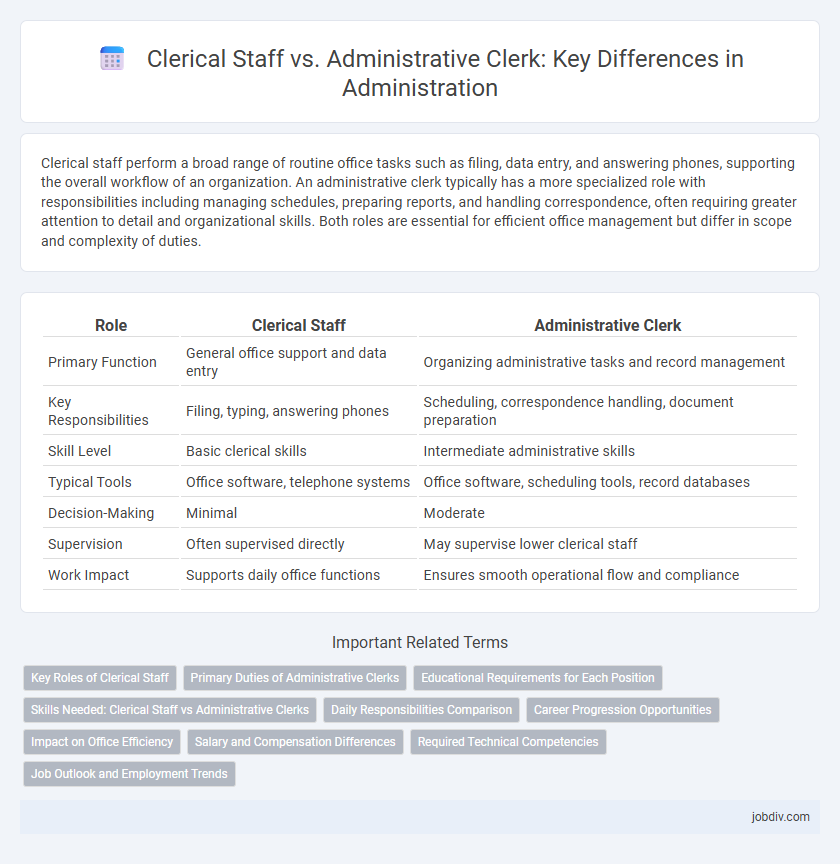Clerical staff perform a broad range of routine office tasks such as filing, data entry, and answering phones, supporting the overall workflow of an organization. An administrative clerk typically has a more specialized role with responsibilities including managing schedules, preparing reports, and handling correspondence, often requiring greater attention to detail and organizational skills. Both roles are essential for efficient office management but differ in scope and complexity of duties.
Table of Comparison
| Role | Clerical Staff | Administrative Clerk |
|---|---|---|
| Primary Function | General office support and data entry | Organizing administrative tasks and record management |
| Key Responsibilities | Filing, typing, answering phones | Scheduling, correspondence handling, document preparation |
| Skill Level | Basic clerical skills | Intermediate administrative skills |
| Typical Tools | Office software, telephone systems | Office software, scheduling tools, record databases |
| Decision-Making | Minimal | Moderate |
| Supervision | Often supervised directly | May supervise lower clerical staff |
| Work Impact | Supports daily office functions | Ensures smooth operational flow and compliance |
Key Roles of Clerical Staff
Clerical staff primarily handle routine office tasks such as data entry, filing, and managing correspondence, ensuring smooth daily operations within an organization. Administrative clerks perform essential record-keeping, document preparation, and basic bookkeeping duties that support management and departmental functions. Key roles of clerical staff include organizing information, maintaining accurate records, and facilitating communication channels across departments.
Primary Duties of Administrative Clerks
Administrative clerks perform essential duties including managing correspondence, maintaining records, and organizing files to ensure smooth office operations. They handle data entry, schedule appointments, and assist in preparing reports, contributing to efficient information flow within the organization. Their role often extends to customer service tasks, supporting internal departments and external clients with administrative assistance.
Educational Requirements for Each Position
Clerical staff typically require a high school diploma or equivalent, with basic training in office software and organizational skills to manage routine tasks effectively. Administrative clerks often need additional qualifications, such as an associate degree or specialized certifications in office administration, to handle more complex responsibilities like recordkeeping and correspondence management. Employers prioritize proficiency in communication, computer literacy, and understanding of office procedures for both positions.
Skills Needed: Clerical Staff vs Administrative Clerks
Clerical staff require strong organizational skills, proficiency in basic office software, and effective communication to manage routine paperwork and data entry tasks efficiently. Administrative clerks need advanced skills in office management, including scheduling, record-keeping, and problem-solving abilities to support higher-level administrative functions. Both roles demand attention to detail and time management, but administrative clerks typically handle more complex responsibilities requiring critical thinking.
Daily Responsibilities Comparison
Clerical staff primarily handle routine tasks such as filing, data entry, and managing correspondence to support overall office operations. Administrative clerks take on more specialized duties including scheduling meetings, preparing reports, and coordinating communication between departments. The daily responsibilities of administrative clerks often require higher organizational skills and a broader understanding of office workflows compared to general clerical staff.
Career Progression Opportunities
Clerical staff typically handle routine tasks such as filing, data entry, and basic correspondence, offering limited career progression opportunities often confined to junior administrative roles. Administrative clerks, however, possess a broader skill set including record management, scheduling, and communication coordination, enabling advancement into supervisory or specialized administrative positions. Pursuing certifications in office administration or project management significantly enhances promotion potential within organizational hierarchies.
Impact on Office Efficiency
Clerical staff handle routine tasks such as data entry, filing, and basic correspondence, which ensures smooth daily operations but may limit focus on complex administrative responsibilities. Administrative clerks often perform higher-level duties including scheduling, report preparation, and managing office workflow, directly contributing to enhanced office efficiency and productivity. Integrating administrative clerks with specialized skills streamlines processes, reduces errors, and supports strategic office management.
Salary and Compensation Differences
Clerical staff typically receive a salary range from $30,000 to $45,000 annually, reflecting entry-level administrative duties, while administrative clerks often earn between $35,000 and $50,000, corresponding to their broader responsibilities and specialized skills. Compensation packages for administrative clerks may include bonuses and benefits such as healthcare, paid leave, and retirement plans, which are less commonly available to lower-level clerical staff. The salary disparity highlights the added value administrative clerks bring through tasks like data management, scheduling, and reporting, suggesting higher market demand for their competencies.
Required Technical Competencies
Clerical staff require proficiency in basic office software, data entry accuracy, and file management to support routine administrative tasks. Administrative clerks must demonstrate advanced skills in document preparation, records management systems, and communication tools to efficiently coordinate office operations. Mastery of time management and organizational software enhances productivity and ensures seamless workflow in administrative roles.
Job Outlook and Employment Trends
Clerical staff positions are expected to decline by 5% over the next decade due to automation and digitization reducing routine data entry tasks. Administrative clerks, however, show a more stable employment trend with a projected 2% growth, as their roles increasingly involve complex scheduling, communication, and office management responsibilities that cannot be easily automated. The evolving demand highlights a shift from basic clerical duties to multifaceted administrative functions requiring advanced organizational and interpersonal skills.
clerical staff vs administrative clerk Infographic

 jobdiv.com
jobdiv.com